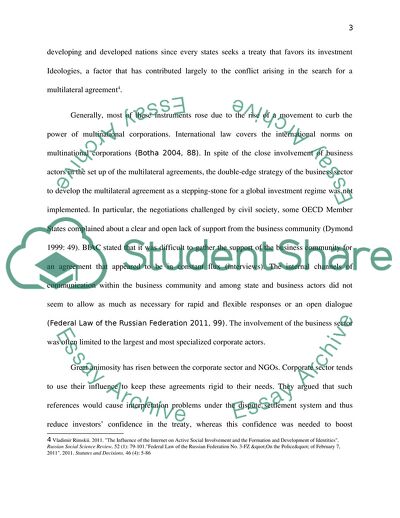
- Home
- Free Samples
- Premium Essays
- Editing Services
- Extra Tools
- Essay Writing Help
- About Us
- Studentshare
- Subjects
- Law
- Multilateralism and the Law, Multilateral Agreements
Multilateralism and the Law, Multilateral Agreements - Essay Example

- Subject: Law
- Type: Essay
- Level: Undergraduate
- Pages: 22 (5500 words)
- Downloads: 0
- Author: fannie05
Extract of sample "Multilateralism and the Law, Multilateral Agreements"
Lawmakers have pushed for the constitution of a multilateral agreement all in a bid to improve the methods of foreign investment. However, these efforts face major objections due to the ideological rifts and clashes of interests as discussed in international law (Natalia 2013, 63). Drafts made were biased and only catered to the interests of the foreign investors thus the objection by the capital-importing countries. Furthermore, Non-Governmental Organizations have complicated the whole issue with their declaration of interest2. However, not all hope is lost since several voices advocating for the formation of comprehensive investment treaties to support investment are surfacing. Their major concern is to support developing countries in their fight against multilateral agreements, that restrict the countries’ ability to control foreign investment.
Developed nations have also found support in certain instruments that favor their interests3. Moreover, this has brewed conflict between developing and developed nations since every state seeks a treaty that favors its investment Ideologies, a factor that has contributed largely to the conflict arising in the search for a multilateral agreement4. Generally, most of these instruments rose due to the rise of a movement to curb the power of multinational corporations. International law covers the international norms of multinational corporations (Botha 2004, 88).
In spite of the close involvement of business actors in the setup of the multilateral agreements, the double-edge strategy of the business sector to develop the multilateral agreement as a stepping-stone for a global investment regime was not implemented. In particular, the negotiations were challenged by civil society, some OECD Member States complained about a clear and open lack of support from the business community (Dymond 1999: 49). BIAC stated that it was difficult to gather the support of the business community for an agreement that appeared to be in constant flux (interviews).
The internal channels of communication within the business community and among state and business actors did not seem to allow as much as necessary for rapid and flexible responses or open dialogue.
...Download file to see next pages Read MoreCHECK THESE SAMPLES OF Multilateralism and the Law, Multilateral Agreements
Soft Power and US Foreign Policy
Main Issues in the New Multilateral Agenda
To What Extent Has the World Trade Organisation Achieved Its Objectives
Theoretical Background for Multilateralism and Regionalism
Multilateral Treaties vs Customary International Law
The Sphere of International Agreements
The Impact of Multilateralism on the Global Economy
Transnational Police Cooperation in Europe

- TERMS & CONDITIONS
- PRIVACY POLICY
- COOKIES POLICY